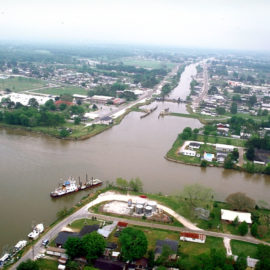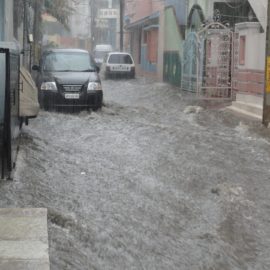
The Corps was blocked to opening the spillway only after consultation with the fishing interests. No longer.
Federal courts have no authority to find that the U.S. Army Corps of Engineers should have prepared a new, comprehensive environmental study of the effects of repeatedly opening the Bonnet Carré Spillway to determine ways of reducing damage to fisheries and tourism in the Mississippi Sound and Mississippi Gulf Coast, a federal appeals court has ruled. That’s because the Corps did not waive sovereign immunity granted it by Congress under the 1928 Flood Control Act, which created the Mississippi River and Tributaries Project under which the spillway was built, said the Monday ruling written by a three-judge panel of the U.S. 5th Circuit Court of Appeals, based in New Orleans. The ruling came in a 2019 lawsuit filed by Mississippi coastal cities and counties, fishers and vacation businesses that charged the Corps violated the National Environmental Policy Act, or NEPA, in not considering the potential damage to fisheries and vacation stays in allowing the repeated spillway openings in recent years. In 2019, the spillway was opened twice for a total of 123 days, which, combined with other flooding issues, resulted in a federal fisheries disaster declaration and the distribution of $88 million in federal relief payments. The appeals court found that because there was no physical change in the spillway structure itself, there was no requirement under NEPA to write a supplemental environmental report. “For better or worse, Congress and the Corps have authority to act on the plaintiff’s dire environmental concerns,” the ruling said. “The federal courts do not.”
nola.com
A three judge panel held the case.
Monday’s ruling was issued by a three-judge panel that includes Circuit Chief Judge Priscilla Richman, appointed by President George W. Bush; Judge James C. Ho, appointed by President Donald Trump; and Judge Kurt D. Englehardt, also appointed by Bush, and was written by Englehardt. The ruling upheld a similar ruling made earlier this year by U.S. District Court Judge Louis Guirola Jr., of Gulfport, also appointed by Bush. In a separate lawsuit against the Corps over operation of the spillway, Guirola in January ruled that the Corps was required by two other federal laws to consult with federal wildlife officials by this September on the spillway’s impact on fish habitat in advance of future openings. In his ruling on those laws, Guirola said the Corps’ sovereign immunity argument did not apply. Last week, the Corps appealed that ruling to the 5th Circuit, based on its soverign immunity argument.
The protection of New Orleans was noted.
In Monday’s 5th Circuit ruling, Englehardt pointed out that the spillway both shields the city of New Orleans from flooding caused by the river’s flow, and also “saves the city the trouble and expense of heightening its levees to manage such flow on its own.” But the ruling said operating the spillway “takes a toll on a host of environmental and economic interests, causing everything from disruptions to oysters, sea turtles and shrimp, to toxic algae blooms, seafood warnings and beach closures.” And it pointed out that while the spillway was originally designed to be operated infrequently and for only short periods of time, six of its 15 openings during its 89-year lifetime have occurred in the past 10 years, and four occurred between 2018 and 2020. “Some expect that matters will only get worse,” the ruling said. “An LSU analysis, for example, projects a notable increase in river flow ‘as a result of riverbed aggradation’ and ‘sand bar growth,’ and, perhaps more predictably, rising global temperatures and intensified hydrologic cycles.”
The judges specifically noted the immunity clause and that Federal Courts held no sway.
But the ruling said federal judges were not given authority by Congress under a separate law governing federal regulations — the Administrative Procedures Act — to order the Corps to address those changes in the spillway’s effects unless there’s been an actual change in the spillway structure, or if the Corps agreed on its own to waive its immunity and do the study. The National Environmental Policy Act requires federal agencies to prepare an initial or supplemental comprehensive environmental impact statement when a major federal action – a construction project, in this case – is going to occur, and not, as in this case, when it’s the outside forces – changes in the river and in weather patterns – that are causing the changes in environmental effects. “Regardless of cause, the increased operation of the spillway that aggrieves the plaintiffs and harms the Mississippi Sound is traceable to the fact that the spillway must now be used more often, not that it must now be used in defiance of its original operational plan,” the ruling said. “New plans by an agency require a supplemental EIS; new circumstances do not.”
This was a narrow ruling only to the spillway.
The ruling did not address whether the same logic would apply to the Magnuson-Stevens Act governing fisheries, or the Endangered Species Act, which are separate federal laws that Guirola ruled the Corps violated by opening the spillway without consulting with NOAA’s National Marine Fisheries Service. The fisheries law requires federal agencies to protect areas that are declared “essential fisheries habitat,” and the Endangered Species Act prohibits actions that could injure endangered or threatened species, such as Gulf sturgeon that live in the Mississippi Sound, Lake Borgne and Lake Pontchartrain. In his ruling, Guirola said future consultation “may well require the Corps to consider alternatives that would lessen environmental harm to the Mississippi plaintiffs,” and, unlike the 5th Circuit panel, found that individual openings of the spillway should be considered separate “actions” under the Magnuson-Stevens Act, and thus not subject to the Corps’ sovereign immunity claim.
Too many competing interests all wanting their way.



